Information?

While dentures of the past may have looked bulky and noticeable, they are now a thing of the past. Dentures provided by Renaissance Dental are designed be quite comfortable as well as look and feel like real teeth! With the help of our knowledgeable and accommodating team, they’ll walk you through the whole process from start-to-finish, so you can start looking forward to leaving our dental office with a confident smile. Whether you need to replace a handful of teeth or all of them, learn more about dentures and partials in Fort Worth, TX by getting in touch with our dental office!


By scheduling an initial consultation with our team at Renaissance Dental, you can be one step closer to renewing your complete smile. We will evaluate your oral health and determine the best approach to replacing any missing teeth. Before beginning your treatment, we’ll have to check several factors about your smile, such as if you have good gum health and sufficient jawbone density to receive your restoration. From there, we may be able to provide you with a durable and lifelike prosthetic that can improve both your bite and overall quality of life! If you want to know if you’re a good candidate for dentures, feel free to read on or reach out to our team in Fort Worth today.

It’s important to know what can cause you to lose teeth and the potential consequences of not replacing them. According to the American College of Prosthodontists, some of the most common reasons for missing teeth involve gum disease, tooth decay, poor oral hygiene habits, and accidental injury. That said, certain systemic conditions can also result in moderate to severe tooth loss.
Once you lose one, several, or all of your teeth, you must get them replaced. If not, you might experience several negative effects on your smile. For instance, any nearby natural teeth can begin to move out of place to fill the gaps, your gum line can start to recede, and your jawbone might gradually shrink or deteriorate. Additional consequences may include difficulty speaking, trouble chewing, facial sagging, and reduced self-esteem.

Generally speaking, nearly anyone who’s struggling with tooth loss can be eligible for dentures. This tooth-replacement option is reliable and convenient for those who are missing some, most, or all of their pearly whites. That said, you’ll need to have healthy gums and a strong jawbone to guarantee the success of your restoration.
The kind of denture you’ll receive will depend on the number of teeth that are missing. Some of these may include full dentures, partial dentures, and implant dentures. This treatment is usually more cost-effective compared to other solutions, making them a great option for patients who are on a budget.

Even if you aren’t a good candidate for dentures, it doesn’t mean they’re the only option you can explore. You might want to consider other tooth-replacement solutions, including:

Have you lost all of your upper and lower teeth? You can still enjoy a complete smile. With a full denture, which is a prosthetic that replaces an entire row of teeth at a time, you can chew food again with confidence. They also work to elongate the face, making you look younger overall. Full dentures use natural suction as well as dental adhesive to rest on top of the gums, making them easily removable for regular cleaning.

Partial dentures are used when you still have some healthy teeth remaining in your smile. To fill the gaps throughout your mouth, we can create a partial denture made from acrylic teeth that are attached to a gum-colored base. Rather than asking you to rely on natural suction or denture adhesive to keep the denture secure, a series of metal clasps wrap around your remaining teeth. This gives the denture added stability. Of course, these dentures remain easily removable for daily maintenance.

As one of the most convenient and reliable ways to replace a person’s missing teeth, you might also be wondering how exactly your dentures will be made. Whether you want to know the materials they’re made out of or the multiple steps involved in physically creating them, this could be a good opportunity to get an inside look at the way your prosthetics are designed to fit your specific smile. Regardless of the type of denture you end up choosing, here’s a glimpse of the denture creation process and what you can expect before receiving your personalized pearly whites.

Firstly, your dentures will involve two major portions: the base and the artificial teeth. Here’s a summary of what the two components consist of:

Dentures require various steps to ensure that they fit perfectly with your mouth while improving your smile. The creation process will generally include the following:

Once you receive your brand-new dentures, you’ll want to take plenty of time to practice and get accustomed to wearing and using them daily. To help make your experience go smoothly, be sure to stick to softer foods to avoid excessive chewing and repeat difficult sounds, words, or phrases so that you learn how to speak clearly with them. Don’t hesitate to ask our team about adhesive or other methods to help keep your prosthetics in place while you adjust to them. After some time, it should feel like you have your natural pearly whites again.

Just like any dental restoration, the cost of dentures varies from person to person. During your initial consultation with us, you will be able to discuss your unique case and what you can expect to pay for your personalized dentures. For now, here are some things for you to keep in mind to have a better understanding of the cost of dentures in Fort Worth.
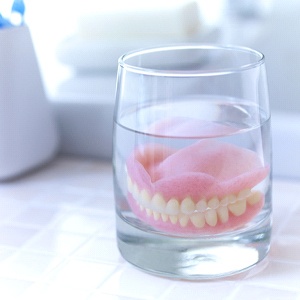
There are several factors that need to be considered when looking at the overall cost of the process of getting dentures. Here are just a few of the most prominent:
Just because you’ve come across cheap dentures doesn’t mean that they are a better option. Budget dentures tend to become damaged more easily and require replacement much sooner than you would typically expect. When it comes to your dental health, high-quality dentures are a worthwhile investment.
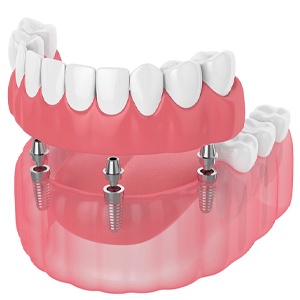
Implant dentures do have a higher cost than traditional dentures because they require oral surgery and the placement of multiple dental implants. However, they do have some unique benefits. They are more stable and last longer than traditional dentures. They also stimulate the jawbone, therefore preventing bone loss as a result of missing teeth.

In most dental plans, you can expect some level of coverage when it comes to your dentures. Many provide up to 50%, but this varies depending on your plan and dental insurance provider. Our practice is in-network with Delta Dental, and we accept all PPO insurances. Our team is more than happy to file claims on your behalf.

If you don’t have dental insurance, this doesn’t necessarily mean that you’re out of luck when it comes to savings. With CareCredit, you can break down your total amount into smaller payments over the course of several months or even years. In most cases, you can expect low-to-zero interest attached.
We also have an in-house dental plan: Renaissance Dental Wellness Club. With this plan, you pay a reasonable annual fee as a member, all without waiting periods, annual maximums, or monthly premiums. You can expect coverage for preventive services like X-rays, regular cleanings, and fluoride treatments. You can also get a 30% discount on all other treatment fees!
The best way to find out how much your dentures will cost is by scheduling an initial consultation with us. This way, we can help you get your smile back!

It doesn’t matter if you’re missing just a few teeth or an entire arch of pearly whites—the issue can greatly impact your day-to-day routine and leave you feeling pretty glum. Not only will you struggle with eating and speaking, but you probably won’t feel too enthusiastic about looking into the bathroom mirror every morning and seeing gaps in your grin. Fortunately, dentures are among the best solutions for addressing missing teeth, and better yet, the restorations are accompanied by several unique benefits! Here’s more about some of these notable advantages.

Your teeth serve an important purpose; they’re your primary means of biting and chewing. However, this isn’t necessarily their only purpose—in fact, they contribute immensely to your overall sense of confidence. People with missing teeth tend to have trouble accepting their tooth loss, and their self-esteem can take a pretty hefty hit that results in sadness and depression, along with an unwillingness to address the issue. But patients who restore their smiles with dentures experience increased confidence and lessened anxiety, meaning that they can resume socializing and enjoying themselves.

Your lips and tongue rely greatly on the position of your teeth in order to make certain sounds, so if you’re missing teeth, your ability to enunciate will suffer. But since dentures act as your missing teeth, they can make it much easier for you to converse! It might take you some practice at first, and you’ll have to endure an adjustment period—but in the end, you’ll be able to speak much more fluently and confidently than when you had gaps in your smile.

Tooth loss can also impact your diet and in turn, your overall nutrition. If you’re unable to chew your food thoroughly before swallowing it, you’re making it more difficult for your stomach to digest the food and absorb nutrients—and you might also experience indigestion and other uncomfortable, undesirable problems. Certain foods, such as hearty options like vegetables, fruits, and lean proteins, are also tougher in texture and sometimes more difficult to chew. But since dentures greatly improve your ability to chew, you can optimize your diet and include healthier options.

When you’re missing teeth, any remaining nearby natural teeth can begin to shift out of place, and if left unchecked, further tooth loss and even jawbone resorption can occur. But getting dentures to restore those gaps in your grin can help you to avoid these complications. Your restorations also bear some of the weight of chewing, which reduces the amount of wear and tear on existing teeth.

Your smile is perhaps the most crucial component when it comes to making first impressions, so having a beautiful, complete smile can certainly go a long way in the professional world when it comes to opportunities! In fact, research shows that the probability of being employed increases when you have a healthy and bright smile. For this reason, dentures can quite literally boost your career and give you an edge during your next interview or presentation.
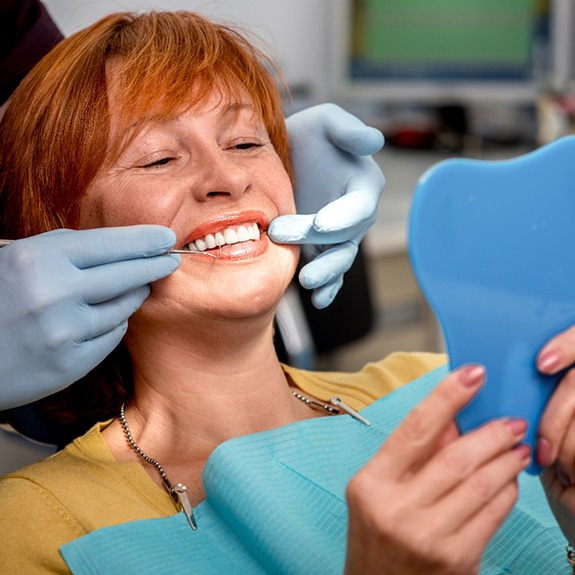
Custom dentures really can restore your smile’s looks and function. Even with them, though, you should still care for your oral health. Dentures depend on maintenance and a healthy mouth to function. Otherwise, they end up causing various long-term problems in your life. Luckily enough, however, we at Renaissance Dental have you covered: below, you’ll find crucial tips on caring for dentures. Please continue reading to learn more about them and maintain your treatment results.
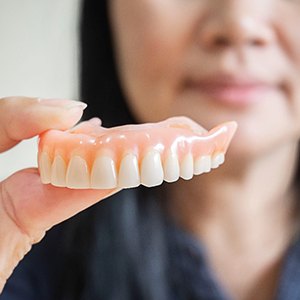
After every meal, you should remove and rinse your dentures. This habit prevents food debris and plaque from clinging to your new teeth. As a result, it reduces your odds of later oral health issues.
Regarding these after-meal rinses, though, don’t use hot water. The truth is that high temperatures warp denture material. Therefore, a hot water rinse might distort your dentures and cause them not to fit.
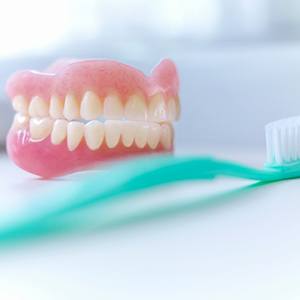
While post-meal rinses do clean your dentures, they aren’t enough on their own. Therefore, try to give your restorations a dedicated, once-daily cleaning. This step eliminates much harmful bacteria from them.
Once you remove them, clean the dentures with a soft-bristled toothbrush and hand soap. Don’t use regular toothpaste – its abrasiveness harms the prosthetics. If there’s time after brushing, you can also soak the restorations in a cleansing solution. Either way, make sure to rinse the dentures before putting them back in your mouth.
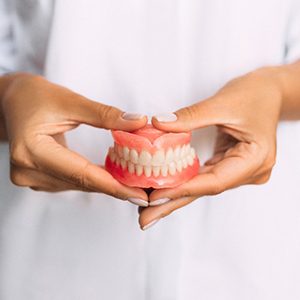
Today’s dentures are certainly durable, but they aren’t invincible. They’ll break or suffer damage if mishandled. With that said, you must keep them safe.
Several approaches could help protect your dentures. For example, you could use a towel during the daily cleaning; a cloth would protect your restorations from falls. Another idea is to store your dentures away from kids or pets. For better or worse, these groups can break your new teeth through roughhousing.

Even if you’re tempted otherwise, take out your dentures before bed. The restorations shouldn’t be worn while you sleep. Instead, it’s better to store them in a denture-soaking solution overnight.
The fact is that overnight denture use is bad for your health. Firstly, it restricts gum circulation enough to trigger soft-tissue irritation. Furthermore, wearing dentures to bed increases your mouth’s plaque levels. Studies even show overnight use increases your risk of severe pneumonia.
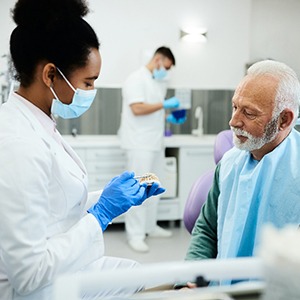
Now and in the future, watch for changes in your dentures and mouth. These shifts – including mouth sores, gum irritation, or signs of infection – can threaten your smile. Therefore, address them quickly by visiting your local dental practice.
In particular, see a dentist when your dentures fit poorly or have damage. Efforts to fix them yourself are likely to backfire. A qualified dentist, meanwhile, will have the training and experience to refit or even replace the restorations.

Dentures are lifechanging for people who are missing several, most of, or all of their teeth, but you want to be well informed before deciding on the future of your smile. Here are the answers to some of the most common questions we receive about dentures. If you don’t see your question listed below, just give us a call! We’d be happy to give you the information you’re looking for and schedule you for your initial consultation.
Dentists will generally recommend that you take out your dentures before you go to bed. However, when you first get your dentures, you will typically be told to keep them in your mouth for 24 hours, including when you sleep. After this, you should be taking them out every evening. Wearing dentures restricts the circulation in your gums, leading to soft tissue irritation and potentially speeding up ridge resorption. Taking dentures out gives the gums a chance to recover and get the nutrients they need during the night. The dark, moist space beneath the dentures is an ideal place for bacteria to thrive. For this reason, sleeping with dentures has been found to be associated with a higher risk of pneumonia. Ultimately, it is best to avoid sleeping with your dentures.
If you need to have teeth extracted before you can get dentures, you are likely to experience some discomfort after the oral surgery. To manage pain, take your over-the-counter and prescribed pain medication as directed. When you first get your new dentures, some minor irritation may occur as your mouth is adjusting to the new appliance. If you’re switching to a new set of dentures, this adjustment period may take longer, but it varies from person to person. If pain persists, give us a call. This way, we can ensure that there aren’t any underlying issues and that your dentures are fitting as they should.
When you first get your dentures, it will take time to get used to speaking with them because you’re so used to speaking with your natural teeth. The amount of time it takes to get used to speaking with dentures is different for everyone, but generally speaking, the more you practice, the faster the adjustment process goes. Try reading out loud to yourself and repeating difficult-to-pronounce words. Speak slowly at first, as fast speech may come out muffled if you’re not used to talking with dentures.
Tough meats like steak are often difficult to chew with dentures, but it’s still possible to do if you take the right precautions. When picking out your steak, select tenderloin or another beef cut that doesn’t contain as many connective tissues or muscle fibers. These elements can make steak more difficult to chew. Be sure that the meat is thoroughly tenderized beforehand. Cut the steak into very small, manageable pieces. The smaller they are, the easier they will be for you to chew with your dentures.
